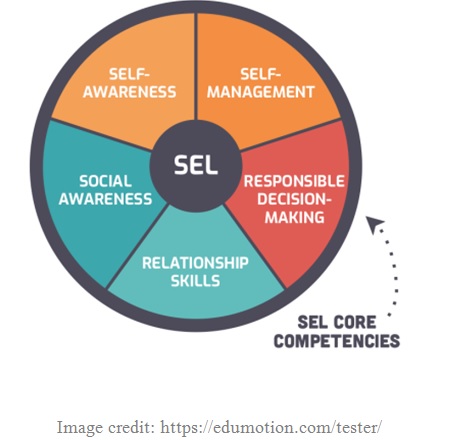Why Social and Emotional Learning is Essential in Education?
30th July 2021
If your emotional abilities aren't in hand, if you don't have self-awareness, if you are not able to manage your distressing emotions, if you can't have empathy and have effective relationships, then no matter how smart you are, you are not going to get very far. -Daniel Goleman
It is refreshing to see that theglobal teaching strategies and techniques are becoming more holistic. Educators and schools are noticing an increased multicultural influence in a single space. With more and more diverse students’background, learners are expected to be prepared well in advance to have fair understanding social emotional cuesand be ready to work with each other in harmony.
The skills children are learning in school are no longer limited to academic skills, there is a need to develop the quality of social and emotional awareness to become a part of the global community.
Why SEL should be a Part of Formal Education?
SEL brings a healthy approach to live life. Managing emotion, knowing one’s feeling without bypassing them is a greater contribution one can practice for self. It also helps to establish a strong core that drives one to feel empowered and overcome challenges in life. Besides self-improvement, SEL fosters an understanding of one's surroundings, respect each-others differences and helps in understanding true meaning of harmonious co-existence.
Educating children with social emotional learning skills can directly influence their future. SEL is not just about teaching “how not to pick a fight”, it builds one’s ability to empathize with one another, “how it feels to be in other’s shoe” and knowing when to offer help.
Social emotional skills magnify positive outcomes in multiple areas of life. Promotes intrapersonal and interpersonal relationships, optimism, confidence, and self-trust. All of these have a massive impact on academic, personal, and professional life. By fostering SEL in education, students can learn how to communicate, collaborate, take decisions, and maintain healthy relationships in both formal and informal places.
Now Let’s Discuss About The Core Social Emotional Skills & How They Function In Life:

- Self- Awareness
Self-Awareness involves recognizing one’s own emotions, understanding the feeling as they occur, and how those feelings reflect through behaviors. It encompasses a realistic view of one’s own emotions, strengths, and weaknesses to have a better approach to managing oneself. With self-awareness one can develop a deeper connection with self and others, having a high level of self-awareness amplifies the ability to become self-reliant, independent, and confident.
- Self-Management
It facilitates all sorts of emotions in a positive direction. Self-management allows one to navigate one's emotions to process, manage, and take action towards cultivating a healthy approach in behavior. It provides a healthy container to manage stress, anger, controls impulses and emotions that arise from negative emotions. Individuals with self-management skills can work towards personal, academic, and professional goals without much distraction.
- Social Awareness
A key skill that every human needs to reside in society, social awareness sets the tone for interconnection, ability to understand other’s feelings, have empathy, kindness, compassion to perceive one another at large. It allows oneself to build the quality of mutual respect for the people not just surrounding to them but for the people who comes across diverse cultural and ethnic background.
- Relationship Skills
Relationship skills facilitate a healthy approach towards establishing and maintaining a positive relationship with one another. With potent relationship skills, individuals can promote coordination, cooperation, skillful communication, and approach conflict resolution cordially.
- Responsible Decision Making
The 5th core skill of responsible decision making involves the ability to assess risk and make an active choice based on considering relevant factors and consequences. It promotes taking ownership of one's decision, weighing the consequence of such decision by honoring the wellbeing of self as well as others.
Today's world needs children who are open minded, explorative, and can use their ability for their highest good. The aim of bringing social emotional learning (SEL) in education is to enable future generations with the power to navigate changes, adjust with tolerance, and thrive in different areas of their life.
Guiding social and emotional development from the initial stage of life is so important that it is only appropriate in building the skills through schooling. Aligning with the global teaching strategies and techniques is one of the essential works of educators. These skills have immense significance on academic performance, choosing a career, and overall success in life.
Written By : Aditi Rao
Leave a Reply

